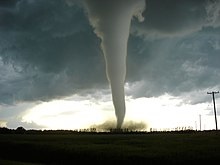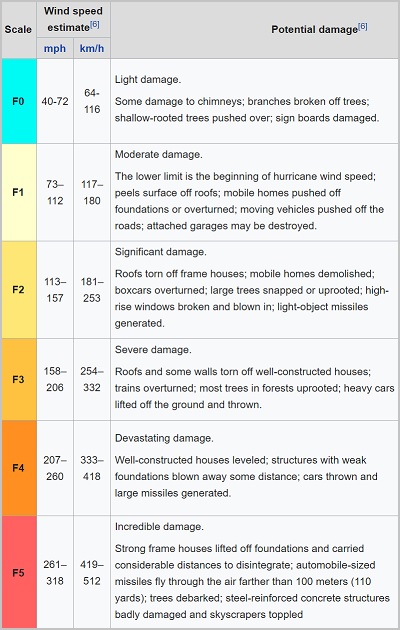|
|
| |
|
|
| |
|
|
|
|
| |
 |
| A tornado
approaching Elie, Manitoba. |
Fujita Scale
The Fujita scale (F-Scale; /fuˈdʒiːtə/), or
Fujita–Pearson scale (FPP scale), is a scale for rating
tornado intensity, based primarily on the damage
tornadoes inflict on human-built structures and
vegetation. The official Fujita scale category is
determined by meteorologists and engineers after a
ground or aerial damage survey, or both; and depending
on the circumstances, ground-swirl patterns (cycloidal
marks), weather radar data, witness testimonies, media
reports and damage imagery, as well as photogrammetry or
videogrammetry if motion picture recording is available.
The Fujita scale was replaced with the Enhanced Fujita
scale (EF-Scale) in the United States in February 2007.
In April 2013, Canada adopted the EF-Scale over the
Fujita scale along with 31 "Specific Damage Indicators"
used by Environment Canada (EC) in their ratings. |
|
Background
The scale was introduced in 1971 by Ted Fujita of the
University of Chicago, in collaboration with Allen
Pearson, head of the National Severe Storms Forecast
Center/NSSFC (currently the Storm Prediction
Center/SPC). The scale was updated in 1973, taking into
account path length and width. In the United States,
starting in 1973, tornadoes were rated soon after
occurrence. The Fujita scale was applied retroactively
to tornadoes reported between 1950 and 1972 in the
National Oceanic and Atmospheric Administration (NOAA)
National Tornado Database. Fujita rated tornadoes from
1916–1992 and Tom Grazulis of The Tornado Project
retroactively rated all known significant tornadoes
(F2–F5 or causing a fatality) in the U.S. back to 1880.
The Fujita scale was adopted in most areas outside of
Great Britain. |
|
| Fujita Scale |
 |
|
|
Decommissioning in the U.S.
In the United States, on February 1, 2007, the Fujita
scale was decommissioned in favor of what scientists
believe is a more accurate Enhanced Fujita Scale. The
meteorologists and engineers who designed the EF Scale
believe it improves on the F-scale on many counts. It
accounts for different degrees of damage that occur with
different types of structures, both manmade and natural.
The expanded and refined damage indicators and degrees
of damage standardize what was somewhat ambiguous. It
also is thought to provide much better estimates of wind
speeds and sets no upper limit on the wind speeds for
the highest level, EF5. Several countries still
use the original Fujita Scale. Environment Canada began
using the Enhanced Fujita scale in Canada on April 18,
2013. |
|
|
 Kiddle: Fujita Scale Kiddle: Fujita Scale
Wikipedia: Fujita Scale |
|
|
|
|
|
|
|
|
|
|
|
|
|
|
|
|
Search Fun Easy English |
|
|
|
|
|
|
|
|
|
|
|
|
|
|
|
About
Contact
Copyright
Resources
Site Map |